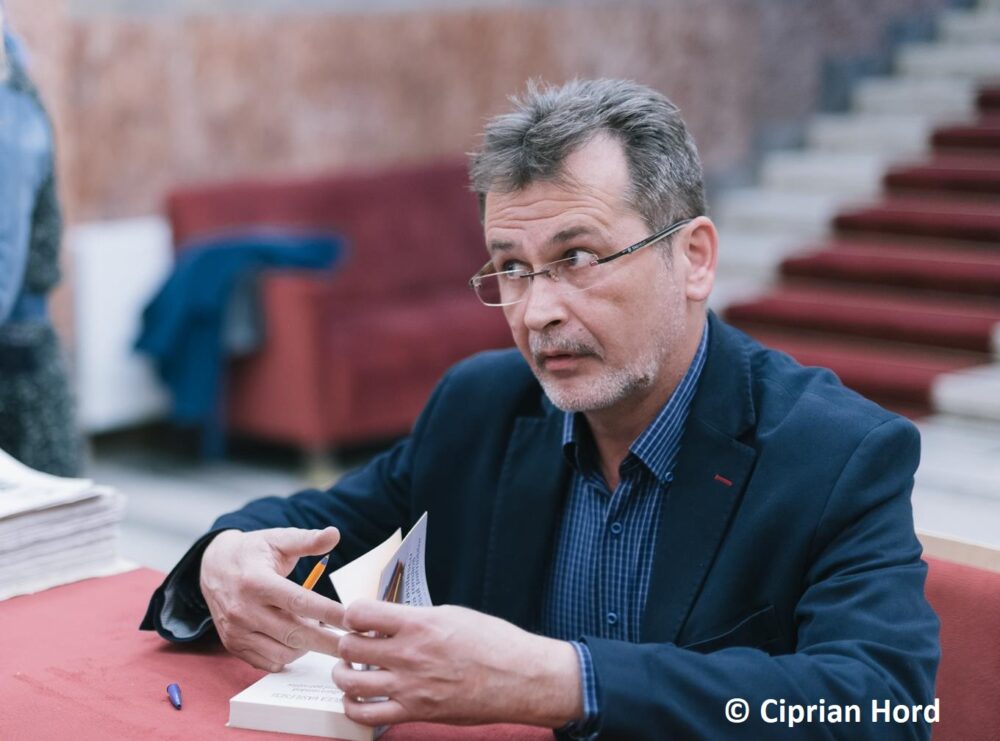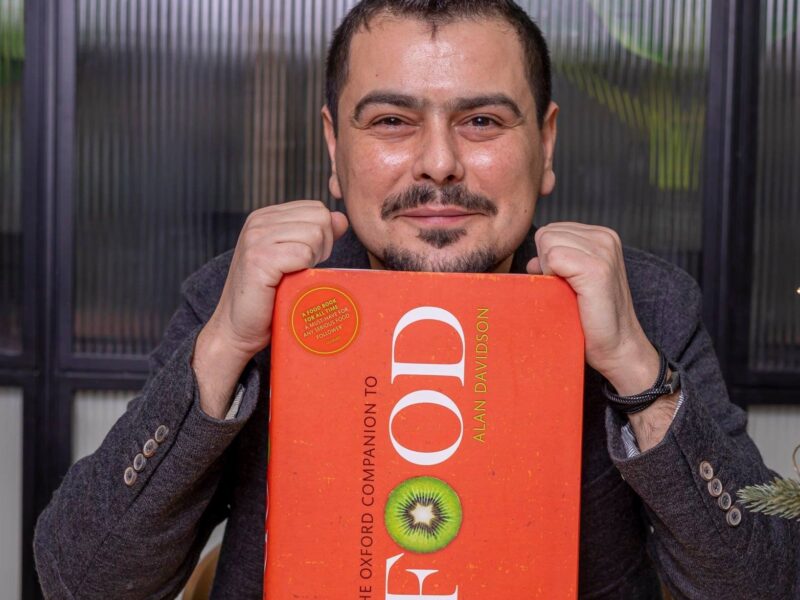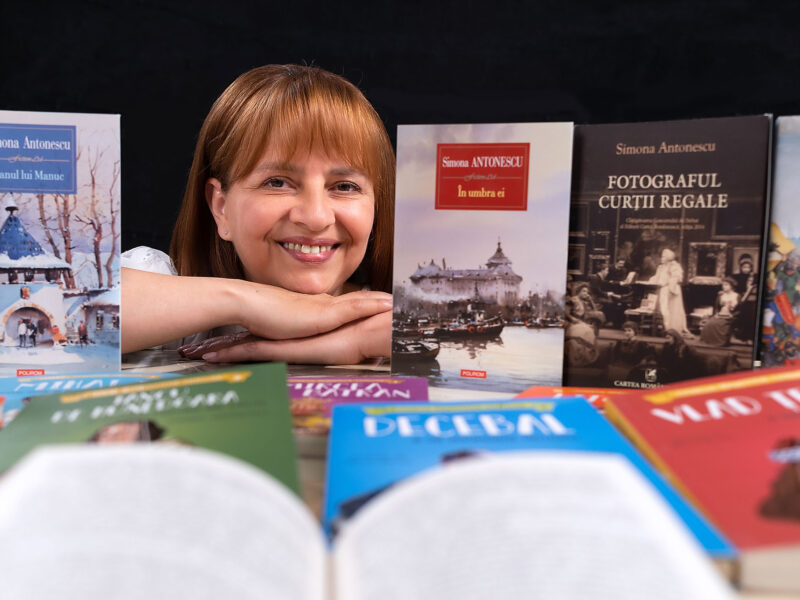Mircea Vasilescu is a writer and professor at the Faculty of Letters of the University of Bucharest. Here he founded and coordinated the Master's degrees in Literary Studies and The Theory and Practice of Publishing. Between 1994 and 1997 he was a senior lecturer in Romanian language and literature at the University La Sapienza in Rome (1994-1997), and visiting professor at the University of Antwerp (2000) and at the University of Vienna (March-July 2003). He was editor-in-chief of the Dilema veche magazine from 1998 to 2015 and member of the editorial board of Eurozine (2008-2012). Among his published volumes are „Iubite cetitoriule…”: Lectură, public şi comunicare în cultura română veche (Editura Paralela 45, 2001), Mass-comédia: Situaţii şi moravuri ale presei de tranziţie (Curtea Veche, 2001), Europa dumitale: Dus-întors între „noi” şi „ei” (Polirom, 2007), Eurotextes: Le continent qui nous sépare (MetisPresses, Geneva, 2010), Cultura română pe înțelesul patrioților (Humanitas Publishing House, 2018). He has translated books by Michel Foucault, François Furet, Sergio Romano. He writes with finesse and humour on his blog.
If you were to re-create Mircea Vasilescu Band, from Dilema veche's18th birthday, what song would you start the show with and what would be the encore? Hey Judesung then in Silver Church has long circulated in student folklore.
What, do you still remember that episode? Has it also circulated in student folklore? What a nice surprise... It was a very nice moment then; we were trying to “invent” a more special moment for the magazine's coming of age... So, we thought we'd sing, like happy teenagers coming of age. The “vast repertoire” included only two songs, Hey Jude and We Will Rock You, and the ad-hoc improvised “band” included Luiza Vasiliu, Matei Martin and Marius Chivu. Sarmalele Reci, who helped us find two easy songs to play after only an hour rehearsal, accompanied us. We would probably play the same songs today, possibly with the addition of Let it be, as we've long since come of age, we'd have wised up by now...
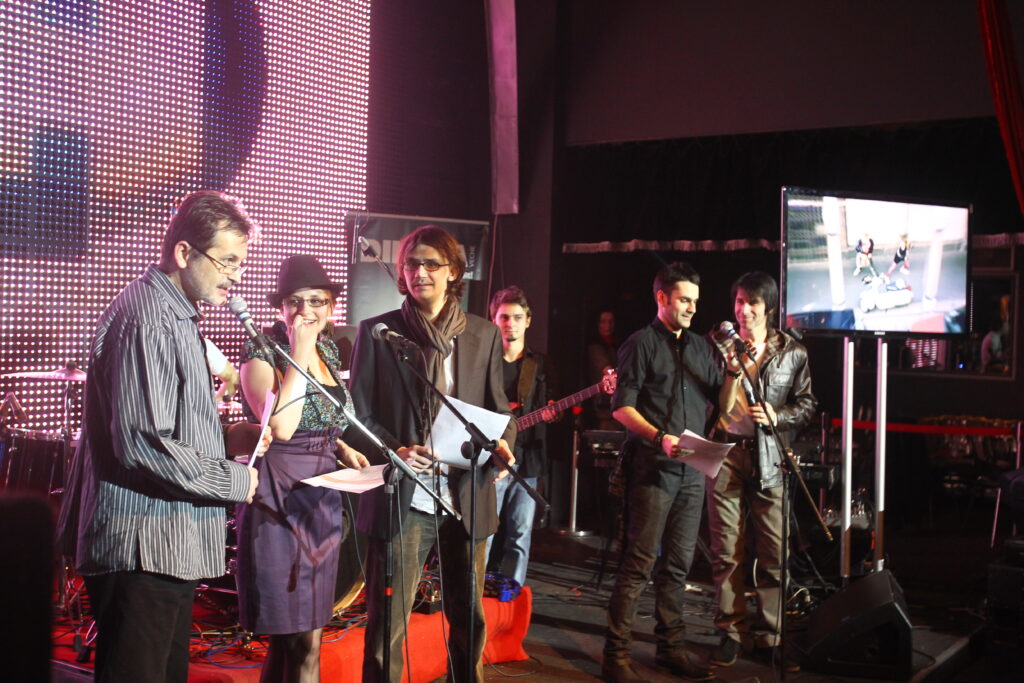
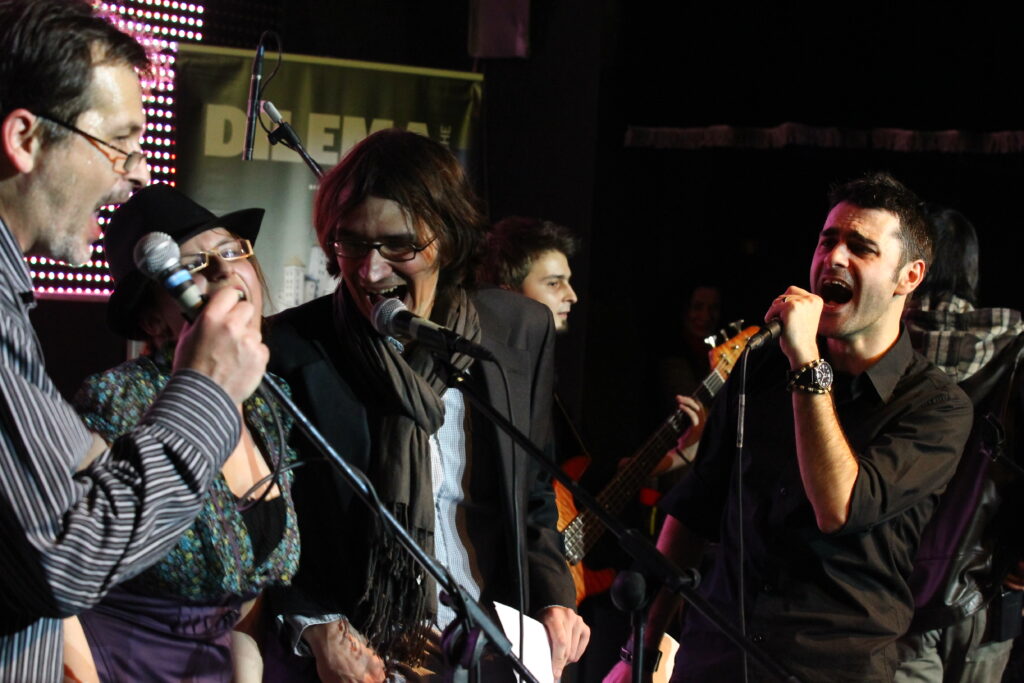
In 2002 you founded the Master’s in the Theory and Practice of Publishing (TPE). How did the idea come about and what was the academic and publishing context at the time?
The academic context was changing. Since 1999, Romania was part of the “Bologna Process”, which involved, among other things, a European standardisation of university study cycles: 3-4-5 years of undergraduate studies (depending on the specialisation), followed by 2 years of master's and 3 years of doctoral studies. After the 1989 revolution, the Faculty of Letters enthusiastically set up master's programmes (or "in-depth studies"), although there was neither legislation nor a specific status for them. So, it was a good time, in 2001, to propose something new. I would say that the idea was “floating in the air” (I know, it's a cliché...), but it was also walking on the ground, among us: from discussions with various people working in the publishing world, but also from some experiences I had abroad (I'll come back to them in a moment). The idea that it would be useful to have a kind of school for publishers and booksellers emerged; there was nothing of this kind in Romania (in fact, there still isn't). The publishing world was in the process of professionalisation: since 1990, thanks to the conquest of the right to free expression, hundreds of publishing houses had been set up. In the early years, anything and everything was published, and some made good money by publishing, for example, translations of inter-war novels found in grandma's attic or books advertised as “sensational” or “censored by the communist regime”... Copyright? Until 1996, when the copyright law came into being, some people didn't even question it... Sure, there were serious publishers from the start, but the process of “cleaning” the system of parasites and improvisations took some time. Maybe someone will write a history of those early years of publishing's merry outlawry sometime. But back to the question. Talking to people in publishing made me realise that a new generation of professionals would need to be created. In addition, I had been a lecturer in Romanian language and literature at La Sapienza University in Rome for about three and a half years and, during that time, I had had the opportunity to study exactly how a publishing system works, large and small bookshops, how books are printed (in a country that has made a major contribution to perfecting the art of printing since the Renaissance)... And yes, in Italy there were schools or courses for publishers and booksellers. I put my experiences and ideas together and began to devise a plan. And, instead of a “school” (because that's what initially came to mind, but it was much harder to set up), I thought of proposing a Master's degree. The decisive impulse was given to me by a conversation with Silviu Lupescu, the director of the Polirom Publishing House (I'm saying this publicly for the first time): he told me that he had hired young philology graduates at Polirom, who have a lot of knowledge, but don't know how to write a text, have no idea what editorial operations are, have no practical skills... “What do you teach them in philology, only learned theories?” - Silviu Lupescu said to me half-jokingly, half seriously. It was the moment when I had the confirmation that something good could come out of my idea.
How did this programme come about? I imagine that (at least) the bureaucratic effort was considerable.
Paradoxically, the bureaucratic effort was simpler than it would be today, when we have a law of education, we have academic accrediting institutions and so on. Back then, two documents were enough: an argumentation and a curriculum plan, which went through the hierarchical steps (from the opinion of the literature department of the faculty to the Rector of the University) and that was it, the Master's started working. Of course, later it was accredited and reaccredited by ARACIS [Romanian Agency for Quality Assurance in Higher Education]according to the legislation that had appeared in the meantime. But back then, the main concern was not the bureaucratic route, but how to make a curriculum as appropriate as possible, taking into account both the training needs of future publishers and the human resources and skills of the faculty. I was obviously also inspired by similar programmes at foreign universities, in particular by the Editoria cartacea e multimediale at the University of Bologna (coordinated at the time by Umberto Eco himself) and a similar programme at the Sorbonne. With the necessary adaptations to our possibilities…
How was this programme, perhaps atypical of the theoretical, philological research orientation, received by your colleagues in the faculty?
Broadly speaking, it was well received. After I had made the plan, I showed it to some experienced professors (including in editing). First of all, I showed it to my master, Professor Paul Cornea, and to Professor Mircea Anghelescu. The discussion within the professors’ office (that's what it was called then, now it's called Department) was useful, but also with small episodes that highlighted - as you say - precisely the atypical character, different in many ways from what was done then in the faculty. For example, I had introduced a one-semester course called “Marketing in Publishing” into the curriculum; not to train specialists (because you can't do that in a single semester), but to introduce future graduates to the basic concepts they would eventually encounter when they worked in a publishing house. Someone objected that marketing “is studied in Business, we are a philology faculty”. I had to argue that the MA graduates will probably work mainly as book editors, but they will work with their colleagues in book promotion, with whom it is good, however, to have a common language... Looking back, I realise that “marketing” still seemed, in our publishing world of twenty years ago, a strange creature: few publishers were then doing promotion systematically and employing people to do just that. And, as the song goes, “memories are haunting me”: some publishers (very good ones, by the way) used to tell me with conviction that “a good book promotes itself and, if it's good, it sells anyway, if it's not good, there's no point in promoting it” or that “dear, you can't advertise books as if they were deodorants, you can't fool readers with advertising...”. O, tempora...
The Great Books. A Short Guide to Recognition and Use, Cultural Press. Publishing Genres and Species, The Translation and Editing of Literary Texts, The Sociology of Books and Publishing are some of the courses in the MA. How is the curriculum designed and organised?
When designing it, I had to take several things into account, and sometimes even walk on eggshells. The “cake” called the curriculum is cut into a fixed number of “slices” - courses and workshops, with a certain number of classes and study credits, you can't “stretch” yourself as far as you want out of the desire to cover as much of the field as possible, there are regulations. Then I had to start from the skills and concerns of my department colleagues: well, I said to myself, I'll invent wonderful, “atypical” courses, connected to what is done in Bologna and Paris, but who will teach them? Fortunately, many colleagues were happy to do courses other than the usual ones (in literary history, literary theory etc.), to approach books from new perspectives. In my initial reveries there was also the idea - taken from the Bologna programme - of inviting specialists from outside the faculty to deliver some lectures. In Bologna, one course was given by a former director of Mondadori, for example, another by a very good specialist in the art of printing (who was not a university professor, but an engineer), another by a well-known book designer... Except that the reverie at home didn't match the law of the land: in order to be able to give a master's course you had to have a PhD, the rule said at the time. The specialists I was thinking of didn't have a PhD (nor did the director of Mondadori, but in Bologna you could do without one!). So, I had to limit myself to what could be done under the given conditions. I drew up a plan based on all this and, of course, on the skills needed for graduates to work in the field. The plan (available on the faculty website, here) has changed over time. For several years now, the master's degree has been coordinated by professor and writer Ioana Pârvulescu, who has introduced some new courses, taking into account the students' requirements and the experience gained in the meantime. On the whole, I think it's a balanced plan, with “a bit of everything”: there are courses with a more general syllabus, and some specialised ones - from “critical editions” to “textbook editing”. In the meantime, the “atypical” nature of some courses is no longer so obvious either. The faculty as a whole has changed, has adapted, and no longer focuses only on philological subjects in the literal sense of the term. For example, I teach a course called “Legislation and Cultural Policies in Publishing”. This, too, raised questions at first: "if it's about legislation, shouldn't it be taught by a law specialist?". No one is now surprised by such a course which, of course, does not have a legal perspective, but is an exposition of the laws and programmes (in our country and in other countries) that support books and reading, the institutions that support and finance publishing and so on.
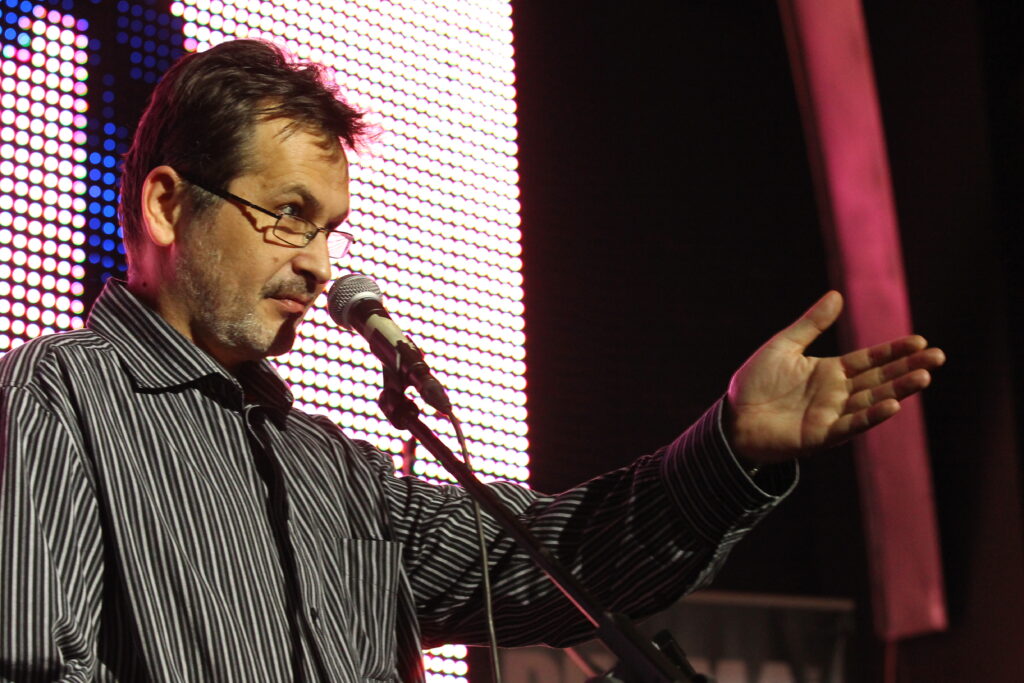
Taking into account the interdisciplinarity of the Master's programme, are there guest professors or other specialists teaching in this Master's programme alongside the faculty’s professors?
As I was saying earlier, in the early days there was a rule: the compulsory PhD for holders of Master's courses, which limited the options for inviting specialists. I have given an example whenever I had the opportunity, and I will repeat it now, because it is interesting in its sad and slightly absurd fun. Theoretically, not even Umberto Eco himself could be hired to give a course here, because he did not have a PhD. In Italy, doctoral studies (as we all know them) were only introduced in 1987, when Eco was already a world-wide summit. Formally, he didn't have a “PhD degree”, so, supposing we had given him a course at our master's degree, we would have run into the regulation in question: it's not possible, he doesn't have a PhD... What do I mean? In the “Bologna Process”, our people were sometimes “more catholic than the Pope”, due to the desire of ticking off the Acquis Communautaireas soon as possible... So, we adapted: we invited colleagues from other faculties - for example, for a while Dinu Dumbrăvician from the University of Arts gave a lecture on book graphics; and Doina Ruști from the Faculty of Journalism and Communication Sciences gave a lecture; and there were others. And we did something else: over the years, we have invited translators, literary agents, publishers, PR people, book fair organisers and others to give lectures or to talk to students during our courses. They always came with pleasure and interest. And pro bono, , of course, because there's another problem: the pay for external collaborators is very poor. In my opinion, it's embarrassing to ask someone to give a master class and at the end of the semester pay them a few hundred lei. Nowadays, the rule on PhD requirement has been relaxed, we can invite specialists without a PhD and we will do it. The question of payment remains...
I remember that in 2012, when I was younger, there was a big fight for the TPE places, many of the colleagues from the Letters were preparing for admission, but students from other faculties were also coming, in their first or second master's degree. What does the admissions dynamic look like now, what is the candidate’s profile?
Indeed, over time we have had students coming from sociology, theology, psychology, foreign languages, history, acting and others. Some of them were already working in publishing and wanted to improve their skills, to know more. At one point we had a graduate from Business who was in charge of publishing specialised magazines in various branches of the economy (construction, transport, etc.) for professionals in the trade. I asked her why she had chosen this master's degree and she told me that, technically, she knew how to make those magazines, with graphics and layout. She was also good at the management and distribution part, but she realised that their weak point was the texts, which were not exactly well written and edited (and I remembered the episode with “marketing is done in Business” and I said to myself: “It is us the philologists who….” .This diversity of candidates (even if most of them come from Letters) seems like a good thing to me, because the Master's degree is not only for those who want to edit literature books. As for the dynamics of admissions, looking back, I think we can't complain: we've always had a large number of applicants. It must be said here that, every year, we have a certain number of “budgeted” places (in recent years there are between 20-25, more recently we had 30-35), depending on what the University and the Ministry approve, and as many “fee-paying” places. The budgeted places have always been filled, most of the time many “fee-paying” places have also been filled. Candidates are generally highly motivated and passionate about the field. It couldn't be otherwise, as you can't work in the book world without passion.
In the interview I did with two master students, Mădălina Marinache and Edward Vasile, Mădălina said that she wanted to take these courses to “learn a trade”. Probably a wish of many students. What are the tools or methods by which they can learn skills needed in the publishing world?
Yes, this is how the MA also appears in the scripts of university accreditation institutions: it is a professional MA (as opposed to the other MA programme organised by our Department, the Literary Studies programme, which is a research MA). ). I would say that the most important thing is the practical, applied nature of the courses and workshops in the MA. We don't really have lectures in the “traditional” sense of the term - i.e., lectures given by the professor in the department; we try to simulate real working situations with students, to explain editorial techniques, to familiarise them with what they would have to do, concretely, in the profession. I felt amazing at one point when a graduate, newly employed at a prestigious publishing house, told me how her first day at work went. She was “welcomed” by an experienced editor, who began to explain to her, one by one and rather “old-fashioned”, what she had to do. “And, Professor,” she said, “with the risk of sounding rude, I said, “I know this because I did it in class with this professor; yes, I know this too because this professor explained it to us.” The man smiled and said “well, get to work; when you come across a problem that your professors haven't explained to you, let me know”. And I would give another example, somehow related to the previous question: I recently spoke to a Master's student from previous years; she is currently working for a publishing house specialising in medical works (she is originally a Letters graduate) and she told me that she really likes what she does, that she had to learn a lot of things in the medical field at the beginning, but she is happy that she has managed to apply the publishing techniques and standards she learnt on the courses. And we have - my colleagues and I - many such stories of our graduates' professional lives: some are now working in PR in publishing houses or bookshops, others are coordinating collections and editorial series, I also know of some who have become editors-in-chief in the meantime... We also have graduates who work in the world of the internet, at various websites/portals, or have worked on audiobooks.
In the same interview, the MA students also mentioned visits to publishing houses or internships in editorial offices or other related institutions among the strengths. At at the agency where I work, we are happy to have the opportunity to collaborate with some of them. How have you established partnerships with publishers and how do they view these internships?
Partnerships have been established over time, through the efforts of my colleagues who coordinate students' internships and through the goodwill of publishers and other institutions. Some publishers have told us they can't take on students because they have no one to look after them; others have been happy to lend a hand. It's natural that this should be the case, we have to align our interests with those of the publishers. In the past years, we have also had two programmes with European funds for student internships in publishing houses, in collaboration with the Romanian Publishers Association. I know that these internships have also resulted in some longer-term collaborations between master's students and publishers, and even some jobs.
I have often come across this contradiction: although many students are interested in a career in publishing, many also complain that they find it difficult to find work after finishing their master's degree; on the other hand, some publishers complain that they find it difficult to find trained people to hire. Where do you think the imbalance is?
We should probably communicate better with each other. So, I take your question as a challenge and answer with the promise that we will strive to make our Master’s more visible.
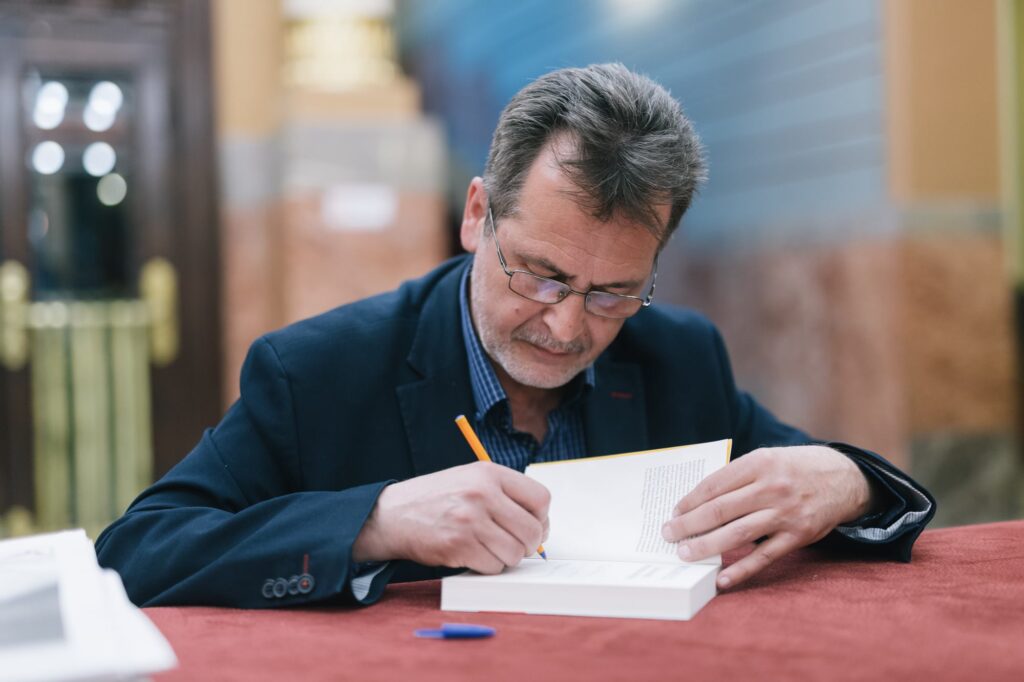
At the same time, I know many graduates who have found work in publishing houses or other institutions in the publishing industry; I have two such colleagues at the agency (one of whom was hired after her internship with us). Do you have feedback from publishers about these graduates? Do you perhaps take into account the impressions or needs of publishers (or other players in the book industry) when designing courses or practical workshops?
All colleagues who teach on this Master's degree have, in one way or another, connections with the publishing world. Ioana Pârvulescu, the coordinator of the master's course, is a writer and translator who has designed and coordinated book collections; George Ardeleanu, who teaches a course on critical editions, has even produced critical editions; Tina Sâmihăian, who teaches a course on textbook publishing, has even edited textbooks; Liviu Papadima, who teaches a course on theories of reading, has over the years been a consultant for various publishers, has coordinated volumes etc. And there are other examples. All my colleagues participate in book launches, meetings with readers, book fairs and other publishing events. Therefore, there is constant communication between us and publishers, we get feedback, we also keep in touch with many of the alumni. I mentioned earlier that, over time, we have removed some courses from the curriculum, precisely because we felt they were “outdated”, and replaced them with others. Whenever we have done this, we have also taken into account some student requirements, and echoes or suggestions we have received from publishers. Maybe we don't always manage to keep up with the publishing dynamic and its needs, but university rhythms are a bit slower, changing the curriculum requires certain procedures and justifications.
A Master's degree can also lay the foundations for a career in the international book industry. What is its openness to what is happening in other publishing markets?
There is definitely an opening. What is happening in other publishing markets is reflected, in one form or another, in the content of many courses. We also have a course called European Publishing: rules, practices, particularities, which Corina Ciocârlie teaches. As for a career in the international book industry, I think it also depends on the degree to which our book industry is connected to the “rest of the world”. My gut feeling is telling me that things have changed for the better on this level too, compared to 20 years ago, when this master's degree was just starting out.
Last year, the MA in Publishing Theory and Practice celebrated its 20th anniversary. What will it look like in 20 years?
Because it is, as I’ve said, a professional Master's degree, it depends on how the publishing industry will look in 20 years' time. The MA will have to prove flexible enough to cope with changes in the industry. What will the industry look like? This is where things get complicated, especially as things are not so good in Romania at the moment. So, we can only reflect, together (master's and industry), on the words of Umberto Eco “don't hope to get rid of books”...
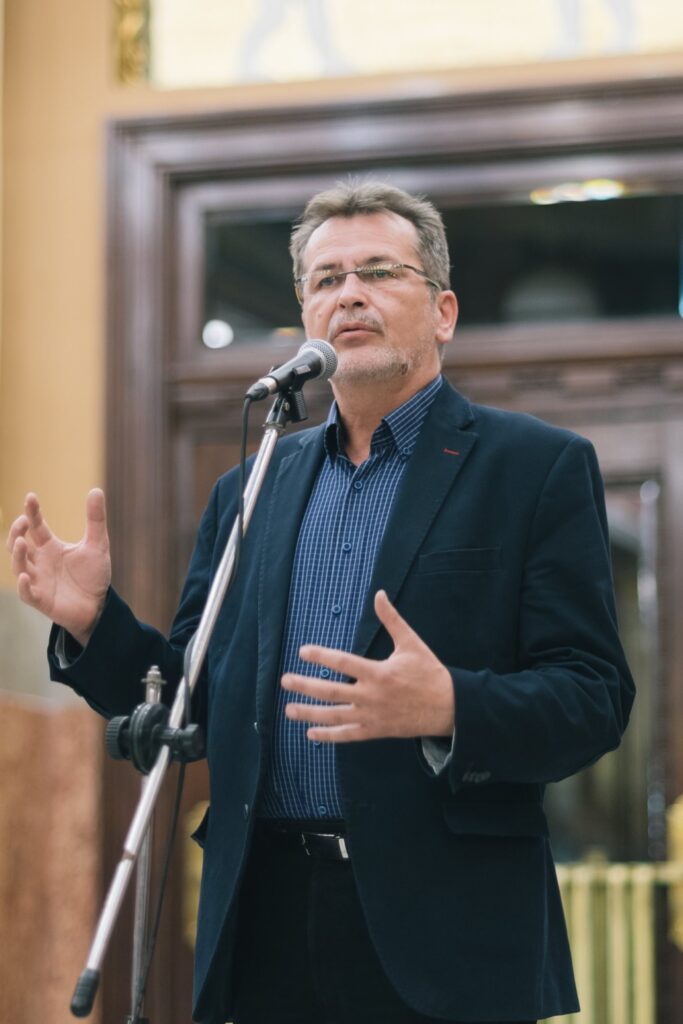
We had “The Year of the Book” in 2019, we had the “Romania Reads” national programme, we have the “National Day of Reading”. What are we still missing?
I feel like you want to start a second interview - as there would be a lot to say on this topic... (I'm kidding, of course). I can only repeat, in less words, what I tell my students in class. We lack medium and long-term cultural policies, well thought out and systematically applied, to stimulate reading and the book market. We lack data that we can analyse to know what we need to do. You mentioned “The Year of the Book” and the (pompous title, forgive me) “Romania Reads”, adopted by Parliament law. Does anyone know what the impact of this law has been? Has anyone measured the impact of “The Year of the Book”? Does anyone know whether Romania has actually read more? I don't know. And I don't think there is such data anywhere. On the contrary, I see that, four years after the so-called programme, Asociația Editorilor din România [the Association of Romanian Publishers] has launched a “Pact for Reading”, noticing that things are still bad. It means that such laws (which for me have a purely celebratory and solemn air, like the National Festival “Cîntarea României” [i.e. Song of praise to Romania] of the old days - but maybe I'm a grumbler...) are not enough. In recent years, Parliament has rejected several draft laws establishing concrete measures in this area (tax exemption for bookshops, allocation of budgets for the purchase of books by public libraries, vouchers for pupils and teachers to buy books etc.). So, I come back to the question about connections with “other book markets”: there are models of cultural policies from which we can draw inspiration, I give students examples from the UK, the US, Sweden, Italy, France, where measures to increase the number of readers have been successfully implemented. What we need are some legislative measures “like abroad”. And we need MPs who look beyond the toes of their own shoes. Because in the situation that Romania is in, we need legislative measures and their consistent application, year after year. At the social level, reading is a strategic issue: if we want a better society and better educated and better prepared citizens for tomorrow's world, we cannot just leave the publishers and the “market” to fend for themselves without help. So, shall we?
[The photos are part of Mr. Mircea Vasilescu’s archive.] [Translated into English by Oana Dragomir.]

